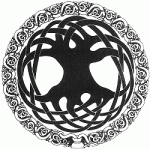It is the best of times. It is the worst of times for the Unitarian-Universalist Association. In one sense the movement may be on the cusp of a revival. As secularism and Postmodernism continue to grow in the west the UUA may gain from the desire of some skeptics to have some sort of spiritual life, even if it means really believing in nothing of substance. The UUA may also benefit from the growth of paganism and the New Age Movement. Since its most important virtue is inclusivism the UUA welcomes all comers.
This is a bit disconcerting to some of the old timers who remember when Unitarianism totally abandoned it’s (albeit heretical) Christian roots to embrace a Naturalistic worldview eschewing all supernatural ideas. The UUA was on the frontline of the 20th Century Modernist revolution in religion, science, ethics, and politics. It was primarily Unitarians who wrote, signed, and promoted the Humanist Manifestoes I, II, and III. So the new trend in the UUA of adding witches, pagans, and occultists to their numbers is regarded by the old guard as, well, (cough, cough) heretical. Nonetheless, UUA pagans are well organized as the Covenent of Unitarian Unverslist Pagans (CUUPS- see logo on this page)
So how do we as evangelical Christians confront this movement today? Obviously, we no longer need to address the original school of Unitarians, like John and John Quincy Adams, who claimed biblical authority for denying the Trinity and the deity of Christ. That form of Unitarianism was expunged in the last two centuries. Today it is “Unitarian” in name only. That being said, we will have to approach UUA with a sort double barreled blast. (Excuse my somewhat militaristic analogy, I am only using it figuratively. So don’t run out and get a shot gun and say I told you do so!)
So, in barrel one, given the Naturalistic bent of most UUAs our apologetic approach must essentially be like that of engaging anyone with that worldview. We have to show them the irrationally of their dogmatic anti-supernaturalism and the unprovable assumptions upon which it rests. We need to present the reasonable evidences that we have for the existence of the biblical God and the life, death, resurrection of Christ. The UUA needs to recognize that his or her rejection of the biblical worldview is based on faith, not fact.
On the other hand, the other barrel aims at those in the UUA who are coming from paganism or the New Age Movement. These folks must be addressed with the same strategy reserved for those with an Animistic worldview. Granted, they do not reject the supernatural, but just like those in Wicca, Voodoo, Santeria, etc., they are coming at life with a sort of magical perspective that all things have spiritual life. We need to likewise show them the fallacies of their presuppositions and the reasonable validity of Christianity.
The future of the Unitarian- Universalist Association is , frankly, uncertain. They may continue to decline numerically, or with the cultural trends in North America, again prosper. In either case, Christians should lovingly, but firmly engage them with the truth of God’s Word.

